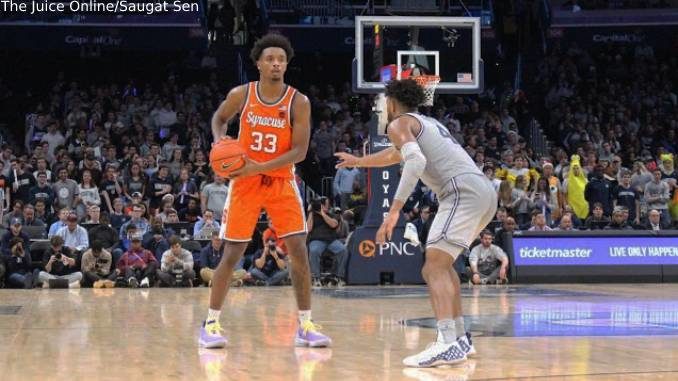
While it was not particularly close, Elijah Hughes was clearly voted to the All-ACC First Team. Hughes finished fifth, garnering 305 points. while the four players in front of him ranged between 367 and 348 points. There was a larger gap between Hughes and the players who finished directly behind him, as Virginia’s Mamadi Diakite received 234 points in sixth place while Florida State’s Devin Vassell and North Carolina’s Garrison Brooks were the only other players to receive more than 200 points.
But, did Hughes really deserve the honor?
I am neither a hot take artist nor an enemy agent in an orange hoodie. In fact, a little over five years ago, this very site featured a column by me proclaiming Michael Gbinije should be All-ACC Third Team as a redshirt junior and, had my March column the following year had a different assigned date, a remarkably similar one stating he should have been All-ACC First Team (he got no love and second team, respectively).
Anyway, a lot of Hughes’ campaign resided in one simple fact: he led the ACC in scoring. This is a fact. He also was second in threes and threes attempted, third in free throws, fourth in free throws attempted, and fifth in free throw percentage over the course of the full season.
But, what about just ACC games? Well, he was second in scoring, second in free throws, fourth in three throws made, sixth in free throw percentage, and 12th in threes made per game. But, three-point percentage?
Well, that’s hard to say, because the leaderboard does not go that far. What can be said is that in all ACC games, 32.8 percent of three-pointers were made. That’s not great.
In ACC games, Elijah Hughes made just 29.7 percent of his three-point shots. That is well below the conference average, which includes every unanswered shot clock and half-ending heave as well as every antsy fling at the rim by a walk-on hoping to get free drinks in 15 years because he scored in an ACC game.
» Related: Here’s how COVID-19 impacts Syracuse forward Elijah Hughes’ pro decision
If watching Joe Girard III take and miss a bunch of ill-advised threes in conference games raised your ire this season, you should probably know that he made 32.6 percent of his triples in ACC play. Girard also made five more threes than Hughes in ACC play.
It was not all about shooting for Hughes, as he did average 3.4 assists per game on the season. He did, however, had out 32 of them in four non-conference games against Colgate, Cornell, Georgetown, and Niagara. That leaves 2.8 assists per game beyond that and 2.6 per game in ACC play, which was 22nd in the conference.
Frankly, Hughes’ name is missing from the leaderboards in ACC play outside of shooting the ball. Aside from barely making the top 25 in assists, he finished in a tie for 14th in steals with teammate Bourama Sidibe and fifth in minutes. His entire case for the first team honor can be summed up with “he played a lot, had a very green light to shoot, and went to the line a bunch.”
Advanced stats were unkind to him, as well. For all those points, he finished 12th in offensive efficiency in the ACC on the full season, putting him five spots behind Marek Dolezaj. He also finished 18th in win shares per 40 minutes behind another teammate. The much-maligned Bourama Sidibe finished 15th in that category.
Both Dolezaj and Sidibe are asked to do a lot less on offense, so it makes sense that they would look better in these categories.
That said, it is difficult for me to say Hughes should have beaten Mamadi Diakite for first team honors. Diakite played eight percent fewer minutes than Hughes in the ACC and his Cavaliers also played at a much slower pace than Syracuse. Virginia averaged the fewest possessions in kenpom’s adjusted tempo at 59.4. SU averaged 68.3 possessions, a hair under 15 percent more.
While playing substantially fewer minutes and possessions, Diakite averaged 13.5 points and 6.7 rebounds per game in conference action, and was the conference’s Defensive Player of the Year. While not an outside shooter, as evidenced by his 31 attempts from beyond the arc, Diakite actually outshot Hughes by making a not quite league-average 32.3 percent from deep.
Diakite’s raw numbers look solid on the leaderboards, but not special, as he finished 13th in points, 16th in points per game, 17th in rebounds per game, 12th in free throw percentage, and tied for fifth in blocks. He also did not shoot enough times (10.1 attempts per game), but made 49 percent of his field goals, which would have ranked fifth.
However, had Diakite matched Hughes’ minutes and team possessions, he would have averaged 18.0 points, 8.9 rebounds, and 1.8 blocks per game. Those numbers would have placed him third, third, and fourth in the conference while being the conference Defensive Player of the Year. Diakite was simply a significantly more efficient player and defensive ace who played fewer minutes on a team with a significantly slower pace.
Looks like Syracuse has a little less to complain about the next time the ACC votes on something.
For more Syracuse coverage, Like our Facebook page and follow us @TheJuiceOnline.

